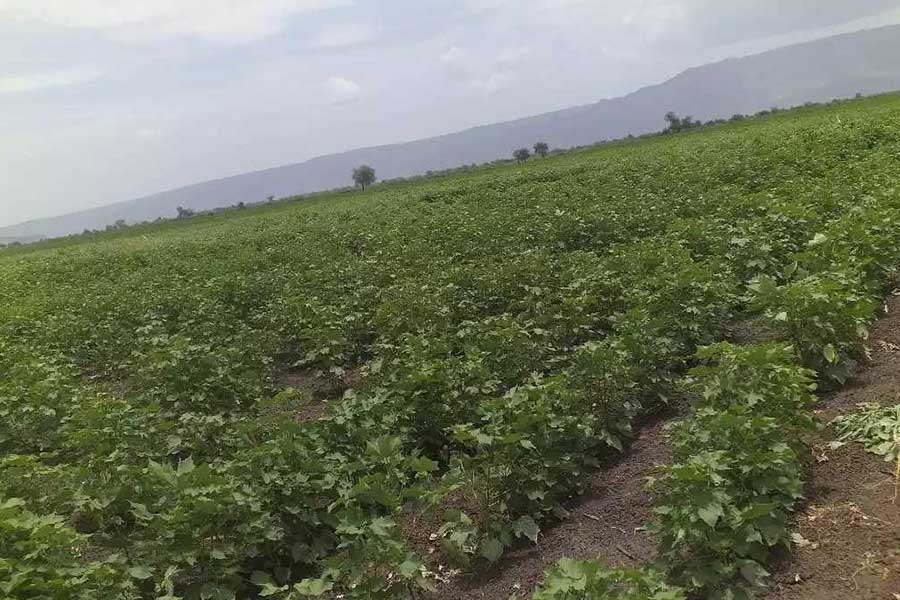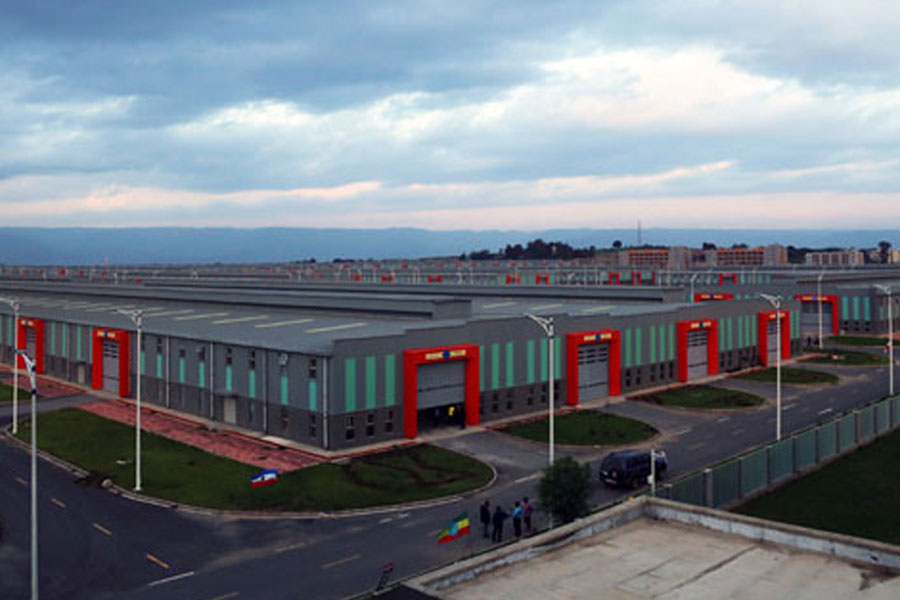
Fortune News | Apr 29,2023
Attempts by federal officials to buy raw materials for garment and textile factories have gone awry for the second time in a week.
The volume of yarn and thread the Enterprise is attempting to procure covers 20pc of the quarterly demand of small and medium garment and textile companies operating nationwide. Annual demand from close to 3,000 of these manufacturers is estimated at around 12,000tn. The domestic market satisfies close to 80pc of the total demand.
Officials of the Ethiopian Industrial Inputs Development Enterprise (EIIDE) have not succeeded in buying 600tn of yarn and thread to be distributed to small and medium textile manufacturers. Although around a dozen suppliers responded to a public tender issued last November to procure these materials, only one submitted an offer on February 2, 2022. State procurement laws require the Enterprise to go on closed bidding.
Neither was their attempt to buy 10,000tn of cotton through an open bid process last week a success. They have rescheduled the bid for later this month.
The Enterprise is awaiting a list of suppliers from the Ethiopian Textile Industry Development Institute (ETIDI), according to Endeshaw Legesse, director of industrial inputs procurement.
The Enterprise has floated at least four tenders annually to procure cotton, yarn, and thread; it has yet to successfully buy raw materials through a closed bidding process.
Endashaw says the issue comes down to suppliers' requests for advance payments.
“They're paid in hard currency," he said. "Accessing it on time has been a challenge."
The Enterprise has repeatedly faced similar frustration in its attempts to buy raw materials for the textile industry over the past two years. It has been resorting to closed bids to complete the procurements, bound by laws that dictate public enterprises and federal agencies resort to other options when less than two bidders make an offer. There is a range of options for those in charge of public procurements, from open bidding to two-stage tendering and from restricted tendering to direct procurement and electronic bidding.
Addis Tsadik, an independent law consultant, says this is designed to safeguard the procurement process from unlawful practices and corruption.
“Unless the procurement is for a national emergency, changing the existing procurement process might expose it to more corruption,” he said.
Public procurement officials may obtain waivers from the Ministry of Finance to buy without competitive bidding when suppliers are limited to one, the goods or services to be acquired have urgency or national security or no more than two bidders appear when tenders are issued repeatedly. Nonetheless, in the aftermath of COVID-19, federal officials permitted public institutions to procure sanitary products without following the procurement procedures.
Officials say the latest procurement is an attempt to stabilise the price of raw materials in the local market, which are volatile. Previous procurements have been effective, according to Endeshaw. Packs of thread known locally as "Menen" were sold for 80 Br apiece a while ago, but prices dropped by more than half after imported thread was made available at the Enterprises' outlets. EIIDE operates 83 outlets across the country, where factories can buy raw materials on credit.
Located in Arba Minch town, 440Km south of Addis Abeba, Negat Chora Sewing Factory could benefit from the Enterprise's procurement. Established in 2007 with a registered capital of 24,000 Br, the factory faced challenges in buying thread and yarn from local markets, according to Ferew Ermias, one of the company's founding shareholders.
The company buys up to 60 cases of thread during peak season, double its regular demand. The materials are difficult to get during the peak production season, says Ferew.
"Wholesalers hoard the raw materials, creating artificial shortages to sell at higher prices," he said.
Negat Chora has seen its capital swell to 1.5 million Br in its 15 years of operation, employing 15 people.
The Enterprise's floundering efforts to buy cotton also spell trouble for the 122 large-scale textile factories in ginning, spinning, weaving and knitting. Eight of these are stand-alone spinning factories that produce open-end, ring and combed yarn; the 19 semi-integrated and eight integrated mills are also spinning. Combined, these factories have an installed capacity of 102,000tn of cotton yarn.
Established in 2008 with 160 million Br in registered capital, Adama Spinning Factory is one of these. Although it has an annual production capacity of 3,650tn of yarn, the factory has struggled to use its full potential due to a shortage of cotton supplies. It had forced the Factory to stop production for a few weeks last year.
"If there weren't a cotton shortage, local spinning factories could satisfy the demand for yarn," said Yimer Yimam, chief executive officer (CEO) of Adama Spinning.
Close to 40pc of the yarn the factory produces is used to manufacture socks. It supplies yarn to three garment and textile factories in the Eastern Industry Zone in Dukem town, less than 40Km from the capital.
Adama Spinning is running tests to expand into the production of woven fabrics, investing 200 million Br on the venture, according to Yimer.
“Creating forward and backward integration is critical to advance the industry,” he said.
Bangladesh, Indonesia and Vietnam are significant players in the international market because they have managed to create strong linkage, says Abera Rechi (PhD), an associate professor and director of the Ethiopian Institute of Textile & Fashion Technology under Bahir Dar University.
“The main raw material these countries import is cotton,” Abera said. “All the industries, from ginning to clothing manufacturers, are integrated locally.”
According to the expert, the problem boils down to the cotton supply.
Only six percent of the three million hectares of farmland suitable for cultivating cotton is used in Ethiopia. The textile industry requires an average of 55,000tn of cotton each year, with domestic production forecasted to meet around 60pc of this demand.
When the private sector fails to bridge the gap between demand and supply, the government must intervene, argues Abera.
“Large scale state-owned cotton farms must be established,” he said. “After a certain period, the government can withdraw from the industry, transferring its stakes to private investors."
PUBLISHED ON
Mar 05,2022 [ VOL
22 , NO
1140]

Fortune News | Apr 29,2023

Featured | Oct 11,2020

Fortune News | May 08,2021

Fortune News | Oct 28,2023

Radar | Aug 12,2023

Radar | Aug 29,2020

Fortune News | Mar 13,2021

Radar | Mar 04,2023

Viewpoints | Jun 29,2019

Radar | Feb 06,2021

Dec 22 , 2024 . By TIZITA SHEWAFERAW
Charged with transforming colossal state-owned enterprises into modern and competitiv...

Aug 18 , 2024 . By AKSAH ITALO
Although predictable Yonas Zerihun's job in the ride-hailing service is not immune to...

Jul 28 , 2024 . By TIZITA SHEWAFERAW
Unhabitual, perhaps too many, Samuel Gebreyohannes, 38, used to occasionally enjoy a couple of beers at breakfast. However, he recently swit...

Jul 13 , 2024 . By AKSAH ITALO
Investors who rely on tractors, trucks, and field vehicles for commuting, transporting commodities, and f...

Jun 28 , 2025
Meseret Damtie, the assertive auditor general, has never been shy about naming names...

Jun 21 , 2025
A well-worn adage says, “Budget is not destiny, but it is direction.” Examining t...

Jun 14 , 2025
Yet again, the Horn of Africa is bracing for trouble. A region already frayed by wars...

Jun 7 , 2025
Few promises shine brighter in Addis Abeba than the pledge of a roof for every family...